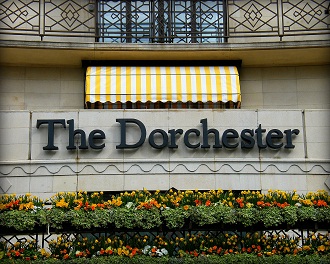Top Hotel Orders Female Staff to Shave Their Legs
Top Hotel Orders Female Staff to Shave Their Legs

The management of London’s exclusive Dorchester hotel has found itself under fire after sending a list of grooming demands to female employees. Women working in the five-star, £700 pound-a-night establishment have been asked not to turn up for work with bad breath or oily skin, and are instructed to arrive for work wearing full make-up, although garish colours are discouraged. They have also been advised to make sure their legs are shaven at all times, even if they are wearing tights.
One unnamed employee said: “It is disgusting . . . and downright offensive.”
“The women are all pretty livid but worry that if they complain – or rebel and turn up to work with chipped, dirty nails and hairy legs, for example, they’ll be sacked on the spot,” she said.
General manager Roland Fasel said: “The Dorchester has a proud community of employees who uphold world-leading hospitality standards including grooming, in line with many other luxury brands . . . All new applicants are sent a copy of our grooming standards in advance of interview.”
Hotel ‘could be sued’ over grooming rules
Employment law and trade union experts say women could bring discrimination lawsuits against the hotel based on its grooming demands.
While dress codes are lawful in so far as they relate directly to the requirements of a job, they could be challenged if thought to encourage the objectification of employees.
Employers could be in breach of the law if staff are asked to look a certain way which has no bearing on their ability to do a job.
What employers need to know about grooming rules
An appearance policy should be reasonable and proportionate in its nature, with particular reference to the actual tasks that are being discharged. If it is not, and a member of staff is dismissed for failing to comply with the code, a claim for direct discrimination on the grounds of gender may be made if there has been a detriment for one gender over the other. This may be accompanied by a claim for unfair dismissal.
While a dress code that treats women less favourably than men is discriminatory, even a policy applied to both male and female employees may still be particularly disadvantageous to female staff, and that disadvantage would need to be objectively justified. Codes for men and women do not necessarily have to be identical, as there will often clearly be different requirements for staff according to gender, but the respective codes do have to embody similar standards. In the Dorchester case, it is not clear what the equivalent grooming policy is for male employees.
An employer’s dress code or appearance policy must not be discriminatory in respect of the protected characteristics in the 2010 Equality Act for age, gender, disability, gender reassignment, religion or belief, or sexual orientation.
Employers must proceed with caution
In the deployment of a grooming code, employers must proceed with caution in case they were seen to indirectly discriminate against an employee. A requirement not to display any excess body hair, including on the face, could be viewed as discriminatory against those with a medical condition such as polycystic ovary syndrome (PCOS). The high levels of so-called “male hormones” in the body associated with PCOS may lead to excess facial or body hair, and so a blanket policy of no facial hair could amount to indirect discrimination on the grounds of disability and gender.
A requirement about hair removal also has the potential to unlawfully offend the religious or other beliefs of women whose belief system does not allow the removal of hair.
Call for an end to the objectification of women
Sam Smether, chief executive of women’s rights organisation, The Fawcett Society, said: “It is completely unacceptable for any woman to be told what she should wear and how she should look.”
“Employers should concentrate on what enables people to do a good job and what drives productivity. This is 2016 not 1970; we need to see an end to this kind of objectification of women,” she added.
Contact our experienced employment lawyers
Find out how we can protect your business and your reputation as a fair employer. For advice on creating fair employment policies and contracts, call our employment law experts today on 01895 207892 or email employment@ibblaw.co.uk. Alternatively please visit https://www.ibblaw.co.uk/service/employment/employment-law-businesses .
